- Home
- David Leavitt
Shelter in Place Page 7
Shelter in Place Read online
Page 7
“An apartment, and it isn’t really a palazzo.”
“What makes you say that?”
“Anyway, is it even a sure thing, their buying this place?”
“Why do you ask? Did Bruce say something?”
“Who said anything about Bruce?”
“So he did say something. I knew it. I knew there was trouble when he decided to take the dogs for a walk.”
“Why?”
“It’s how they fight—Bruce taking the dogs for a walk. They aren’t like other couples, Jake. They don’t scream or yell. That’s why I asked you to go with him, I was hoping you might … smooth any rough waters. Because if Bruce were to pull the plug on this … God, I don’t even want to think about it.”
“And what makes you think he’ll pull the plug on it?”
“So he’s not pulling the plug on it?”
“I didn’t say that.”
“So he is?”
“Oh, for God’s sake, Min, I didn’t say that either.”
“OK, sorry. Look, let’s just take a deep breath, OK? Let’s just take a deep breath and step back for a second and look at this thing objectively. In the event—I’m not saying he is and I’m not saying he isn’t—but in the event that Bruce is possibly, maybe thinking about pulling the plug on this apartment that his wife has her heart set on—well, isn’t that all the more reason to give the green light to the magazine cover? Because then, if it’s a sure thing, he won’t be able to.”
“Why not?”
“He just wouldn’t. The stakes would be too high.”
“You’re moving too fast, Min. You’re asking me to commit to the magazine when I haven’t even committed to the apartment.”
“Just promise me you’ll think about this carefully. That’s all I ask.”
After they hung up, Min got up again, walked to the refrigerator, took out the stick of sugared butter, and finished it off. She then lit a joint, took a long toke, and returned to bed. That she had just told an immense lie—in fact she had never even mentioned Eva’s apartment to her editor, much less obtained her promise to put it on the magazine’s cover—mattered less to her, at this moment, than the vision (there was no other word for it) that had come to her in that flash, as if through some celestial agency. Of course, until things fell into place, until reality caught up with the vision, she would have to watch her step. And yet, as she lay in her full-size bed, enjoying the warm drowsiness brought on by the pot, she was not thinking about the care she would have to take during the coming weeks. She was thinking of the magazine cover as she envisioned it, the headline—A NEW LIFE IN THE OLD WORLD—and the photo, which would have to be of the window that gave onto the canal, with the curtains pulled back and the shutters open and the prow of a passing gondola visible through the glass. (But from the piano nobile would one be able to see the gondola without leaning out? Oh, well, she could work out that kink later.) And to the left of the window a gondola chair, fitted with a silk cushion with pom-poms on its corners. And beneath it a sliver of the terrazzo floor. Yes, it would be lovely …
From her bedside table she picked up her phone: 1:31 A.M. She checked the weather, looked at the headlines in the Times and on BuzzFeed, then, as if it were an afterthought, clicked on the Candy Crush app. Over the past year Min had spent many more hours playing Candy Crush than she would ever admit, usually in bed or on the subway, but sometimes at the office too. On the way home from Eva’s tonight, in the taxi, she had nearly cracked level 534 of the Sticky Savannah episode. Now, she decided, she would wrap up level 534 before going to sleep. It shouldn’t take too long.
She pressed her forefinger to the icon and was at once immersed in a realm of jelly beans and jujubes and chocolate balls dusted with sprinkles that reminded her of childhood birthday cakes. The game unpaused, the candy apocalypse recommenced.
PART II
8
What Bruce had wanted to tell Jake during their walk—but he couldn’t find the words—was that, for almost the first time in his life, he was in the throes of a moral and sentimental dilemma. This dilemma, which had been building for months, had been brought to a point of culmination when Eva suddenly decided she had to have the apartment in Venice. Although its terms were monetary, far more than money was at stake: Bruce understood this much. What he couldn’t understand, for the life of him, was how to tease out the manifold strands—financial, emotional, and ethical—of which the dilemma was woven. It was with this untangling that he had hoped Jake could help him.
The facts were manageable, if awful. Back in October, Kathy Pagliaro, his secretary of twenty years, had been diagnosed with stage 3 non-Hodgkin’s lymphoma. A week later her husband, Lou, had left her. As a result, she was now in the midst of simultaneous divorce proceedings and chemotherapy. Kathy was fifty-three. She had children and grandchildren, a house in Syosset, and a home equity loan with a balloon payment coming due. Despite these travails, she came in to work punctually at eight each morning, steadfastly refusing the time off Bruce offered her. The sheer nerve with which she was facing down these catastrophic developments in her life humbled Bruce, and incited in him strong feelings of empathy, an emotion with which he was not overly familiar, and which puzzled him in its present intensity. This feeling had no explicitly carnal aspect. Nevertheless, it bore a distinct resemblance to the upside-down feeling of falling in love, as he remembered it from his early days with Eva. All his life Bruce had hewed to an old-fashioned ideal of chivalry that in his marriage took the form of obeisance, the troubadour’s sacrificial devotion to the damsel outside whose window he sings. And yet, another aspect of chivalry is courage—the courage that spurs the knight to ride headlong into the dragon’s lair and save his beloved. It was this latter impulse, the impulse to rescue, that Kathy’s predicament awakened in him and that led him, for the first time in their marriage, to start lying to his wife.
The lies were the sort you told when you were having an affair, yet Bruce wasn’t having an affair. All he was doing was driving Kathy twice a week from his office to the outpatient center at Sloan Kettering, sitting with her through her chemotherapy sessions, and then driving her to Penn Station to catch the train to Syosset. When, after the first few sessions, she became too sick to manage the commute, he paid for a room for her at a hotel a block from the hospital. From some sixth sense that Eva would disapprove, he said nothing to her about any of this—not the driving, or the hours at Sloan Kettering, or the hotel room, which he had billed to a company credit card she couldn’t access. In case she should call him, he never answered his phone when he was sitting with Kathy in the chemo suite. Instead he would wait until one of the nurses came to look in on Kathy and then go out into the corridor to check the caller’s name. If it was Eva, he would break into a cold sweat. If it wasn’t Eva, he would return to the suite looking so visibly relieved that the nurse would say something like “Everything OK, Mr. Pagliaro?” For by now the nurses took it for granted that he was Kathy’s husband, a misapprehension he did nothing to correct.
What made all this especially baffling was that before her diagnosis, Bruce had never looked upon Kathy as anything but an exceptionally efficient secretary. If he admired her, it was because she was so good at her job, which, with time, had become far more than secretarial, requiring her to keep up with technological innovations in the financial sector by which he himself was flummoxed. If she’d had the chance to get a decent education, he was sure, Kathy could have been a CEO or a senator. But she hadn’t had that chance, and so she was a secretary.
Outside the office, they led entirely separate lives. In twenty years, Bruce had never once been to Kathy’s house in Syosset, nor she to any of his country houses, and to his apartment only a handful of times, to drop off documents. She knew certain things about him—she had met Eva—just as he knew certain things about her: that her grandparents were immigrants from Sicily, as were Lou’s; that they had married straight out of high school; that they owned a small sailboat that on
weekends, weather permitting, they took out onto Long Island Sound. Kathy was lean and lithe, with streaked blonde hair and the sort of suntan that can be attained only by spending many active hours outdoors. She was never not on the move, either at Bruce’s office, which she managed with lean efficiency, or in Syosset, where on weekends when the weather made sailing impossible, she and Lou bicycled or played tennis. By profession Lou was a car dealer. As a courtesy to Kathy, Bruce always bought his cars from Lou. When Lou sold Audis, Bruce drove an Audi. When he sold Lexuses, Bruce drove a Lexus. Each time Bruce bought a new car, Eva questioned the necessity of his going all the way out to Syosset to get it when he could just as easily go to a dealer in Manhattan or Connecticut. Nonetheless Bruce persisted in the habit, on the grounds that Lou gave him good deals. His current car, an Outback, he had acquired three weeks before Kathy’s diagnosis, when Lou had been made manager of his local Subaru dealership. This was the car in which he now shepherded her to and from the outpatient center. Because of its association with Lou, he wondered if riding in it might upset her.
One afternoon, on their way to the center, he asked her.
“Why should it upset me?” she answered. “It’s just a car. Anyway, Lou is the least of my worries now.”
By way of reply, Bruce only nodded. That he’d said the wrong thing was obvious; what wasn’t obvious was why it was the wrong thing.
After a minute, as if guessing at his thoughts, Kathy said, “When Lou left, I think the thing that shocked me most was that I wasn’t really shocked. He’s never done well with illness. Any time I caught a cold and started sneezing or coughing, he’d tell me to stop making a spectacle of myself. He doesn’t want to admit how much illness scares him, so he gets short-tempered.
“I used to think this was a failing on his part. Now, though, I’m not so sure. Because now when I look back—and of course, having cancer puts a different light on everything—I find myself thinking, Wow, when I had a cold, I really did make a spectacle of myself. The kids, too. They learned from me.”
“What about Lou?”
“When he gets sick, he just pretends he isn’t. Today we’d say he powers through.”
“Even so, that’s no excuse for what he’s done.”
“He agrees with you on that. In fact, he calls me at least once a day to tell me so.”
“What do you say?”
“What can I say? He wants forgiveness. I won’t give him that, but I’ll hear him out. At least he’s not fighting me on the house.”
“There’s nothing noble in that. He knows there isn’t a chance in hell any judge will give it to him.”
“Yes, but it’s a sacrifice. The other day Michael, my youngest, went to see him. He says Lou’s living in this little crap apartment, practically a motel room. It barely has a kitchen. He only eats takeout.
“The part I can’t get my mind around is that if none of this had happened, if I hadn’t gotten sick, we’d still be together. I mean, it’s not like one of us was having an affair. What it comes down to, I think, is that he’s so afraid of losing me, he’d rather get it over and done with. At first I thought that was cowardice, but now I wonder if it’s a kind of courage.”
They had reached the outpatient center. Bruce dropped Kathy off, parked the Outback, and walked back to join her. The mere sight of the center, as it approached, set his heart racing. Really, he was not much better than Lou. The lobby scared him, as did the patients wandering through it, some dragging their IV drips behind them like dogs on leashes. And yet the lobby might have been that of a hotel. The chemo suite itself was tranquil, the lighting soft, the curtains and carpets colorful but not overly bright, and patterned with beguiling geometries. Usually when Bruce thought of hospitals, he thought of the one in Oshkosh where he’d had his tonsils out, its fluorescent tube lights and nurses in intricately folded caps. At the outpatient center, by contrast, the nurses wore smocks or scrubs. Many were men. Rather than lie in a bed, Kathy received the chemo infusions sitting in a recliner, through a port implanted in her chest. The port was the one thing Bruce still could not quite bring himself to look at.
Each session lasted three hours. During this time, he sat next to Kathy in an armchair. At her request he would raise or lower the shade on the window with a remote control. The suite looked out onto the flags that festooned the entrance to a famous old club of which several of his clients were members, and to which he had never been invited. He told Kathy this. He told her that when he spent time with these clients, all fixtures of old-money New York, he felt like “country come to town.” This made her laugh.
“I’ve never thought of you as country come to town,” she said.
“Oh, but I am,” he said. “My grandfather had a dairy farm. When I was growing up, I spent my summers there …”
But she had fallen into a doze. Gingerly he took his laptop out of his briefcase, opened it, and spent half an hour reading about experimental treatments for non-Hodgkin’s lymphoma. One of these had only a forty percent success rate, but of the forty percent, five years afterwards ninety percent were cancer free. Another was so new that it was unlikely Kathy’s insurance would pay for it. When he’d had enough of this research, he looked Lou up on Google and found his profile on the website of the Subaru dealership. He looked up their children. Danny, the eldest, sold real estate in Manitoba. Susie, the middle child, had a criminal record, the details of which Bruce could obtain if he joined a website that charged $19.95 a month. Michael had a Twitter feed, according to which he “Carly Rae Jepsen” and aspired to a career in interior design.
Ashamed by his own curiosity, Bruce closed the laptop. He gazed at Kathy in sleep. She was tall, with sharp features and dark eyes. The wig she wore, the same streaked blonde as her own hair, didn’t look like a wig. Everyone liked her—the portfolio managers, the administrative assistants and the client service specialists, the IT guy and the receptionist and the clients themselves, especially the old-money ones, the ones who belonged to the club across the street. With the old-money women, Kathy exchanged recipes, with the men the sort of genteel courtesies that in another era passed for flirtation. Privately Bruce wondered if Kathy reminded these clients of the teachers and governesses of their youth. Like a teacher, she always spoke in complete sentences. She dressed cheerfully, in pink or blue pantsuits and skirt suits and silk blouses. Her manner on the phone, at once deferential and brisk, had a calming effect on the clients when they called in a panic because the Dow had suddenly plunged. Only in sleep did she look vulnerable. Her mouth hung half open, like a child’s. Her left arm was crossed over her breasts.
After half an hour, her eyelids fluttered open. She glanced around the room in bewilderment, regaining her composure when her gaze met Bruce’s.
“How are you feeling?”
“So-so.”
“Do you want anything to eat?”
She shook her head. One unexpected effect of the chemo was that she had lost her taste for nearly all foods. Even Chinese food and chocolate, once her favorites, she could no longer stomach. The chemo, she had told Bruce, left a terrible taste in her mouth that only the crudest flavors could mask. Barbecue potato chips and cinnamon buns, the sort that sell for a dollar each in the vending machine, were the things she most often asked for.
Sometimes Susie, her daughter, showed up at the sessions, always unannounced and in a condition of turmoil. Susie was in her early thirties, with dyed black hair that fell in ragged bangs over her forehead. She wore tight black leggings and a leather jacket and was never without an immense handbag from which coins, crumpled envelopes, straws, cigarettes, lighters, restaurant leftovers in Styrofoam boxes, Lego blocks, a cell phone with a cracked screen, and the “decoupages” that, she persisted in claiming, would someday make her rich were perpetually spilling. Her visits were muddled and chaotic, punctuated by sudden unannounced disappearances when she would go outside to smoke. Over time, Bruce, to his own surprise, began to feel something like affection for her. At his
request she showed him the decoupages, anarchic constructions of glue and lacquer and photographs X-Acto-knifed from supermarket tabloids—dissonant, yes, amateurish, yes, and yet he could not deny that they had a certain power, outsize and uncouth as Susie herself and, like Susie, almost endearing in their vehemence. Unlike her mother, Susie did not speak in complete sentences. She did not, so far as Bruce could tell, have complete thoughts. In lieu of conversation, she delivered ragged monologues, mostly about killer mold. “It’s because of killer mold that the girls and me are living with Mom,” she told him when they met. “First we were living in this apartment in Queens Village, only there was this killer mold, and the landlord wouldn’t answer my texts or return my calls, and Chloe, my youngest, her asthma—she has asthma—was getting worse. So then I got the landlord’s address, this fancy house in Little Neck, and I went and rang the doorbell, and it’s his wife who answers, and I go, ‘You’ve got kids—would you want your kids coughing their lungs out?’ and she goes, ‘You better leave now or I’ll call the cops.’ But I must have gotten through to her, because the next day the landlord guy calls and he’s like ‘Nice trick, OK, if you’re that miserable, I have another apartment you can have—it’s in Flushing—only you have to sign a letter saying there isn’t any killer mold.’ So I signed the letter even though it was coercion, and we moved to Flushing and, would you believe, there was even more killer mold in that apartment than the other, so I stopped paying rent and we got evicted and now my credit is shot and no one will rent to me, even though I sent a letter to the housing authority saying I wasn’t only thinking of myself, there were all the other people in the building, all the other children, but the housing authority wouldn’t do anything, and that’s why we had to move back in with Mom and Dad, but if they think I’m giving up they’re wrong, because I’ve got pictures, I’ve got samples I scraped off the walls, forensic evidence, and as soon as I start making money from my decoupages, I’m going to sue the shit out of that lying scumbag and use the money to make him clean up his slums and help the kids there.”

 Shelter in Place
Shelter in Place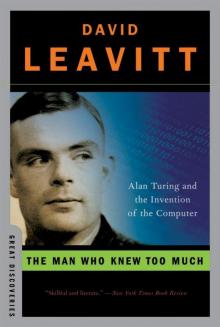 The Man Who Knew Too Much: Alan Turing and the Invention of the Computer (Great Discoveries)
The Man Who Knew Too Much: Alan Turing and the Invention of the Computer (Great Discoveries)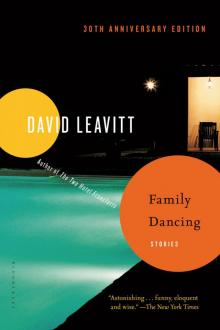 Family Dancing
Family Dancing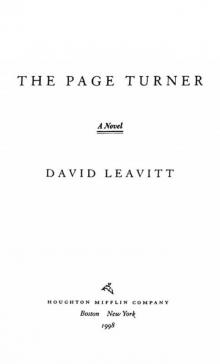 Page Turner Pa
Page Turner Pa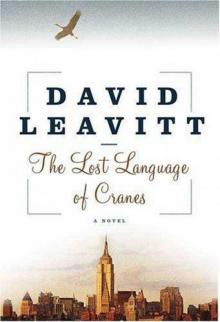 The Lost Language of Cranes: A Novel
The Lost Language of Cranes: A Novel The Body of Jonah Boyd
The Body of Jonah Boyd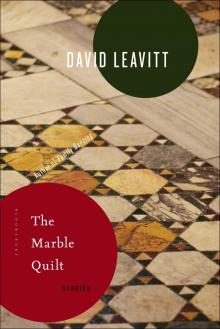 The Marble Quilt
The Marble Quilt In Maremma
In Maremma While England Sleeps
While England Sleeps A Place I've Never Been
A Place I've Never Been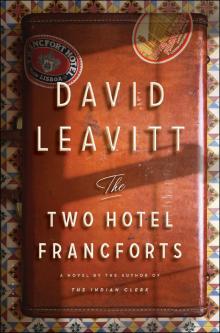 The Two Hotel Francforts
The Two Hotel Francforts The Indian Clerk
The Indian Clerk Florence
Florence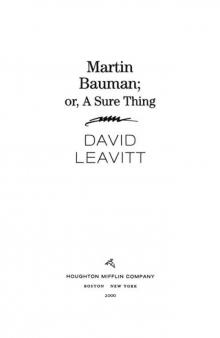 Martin Bauman
Martin Bauman Equal Affections
Equal Affections The Lost Language of Cranes
The Lost Language of Cranes Arkansas
Arkansas